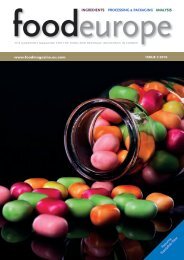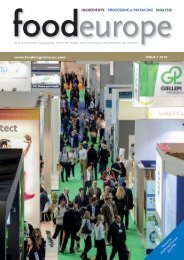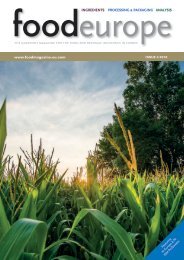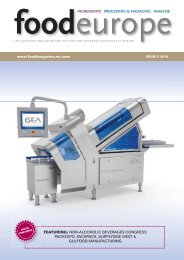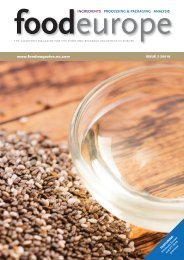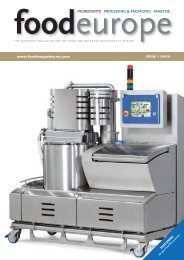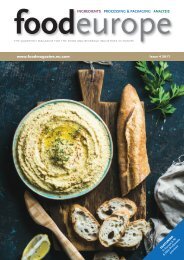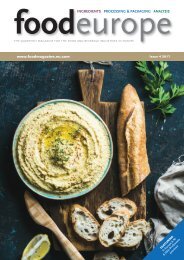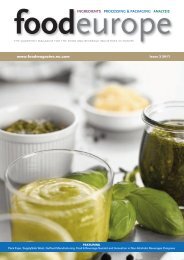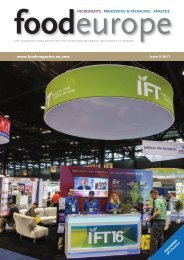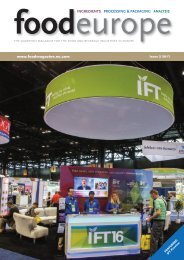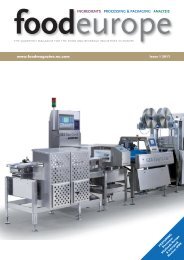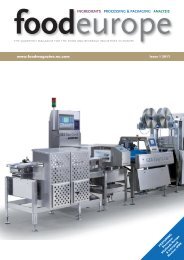food
You also want an ePaper? Increase the reach of your titles
YUMPU automatically turns print PDFs into web optimized ePapers that Google loves.
ingredients 43<br />
■ Probiotics and prebiotics:<br />
targeting probiotic properties<br />
as well as efficacy and viability<br />
of probiotics in <strong>food</strong> products.<br />
(Professor Seppo Salminen).<br />
Additionally, there are services<br />
to assist product development<br />
for small and medium sized<br />
<strong>food</strong> companies and a research<br />
unit of international law<br />
specialising in functional <strong>food</strong>s.<br />
Broadening the field<br />
The Forum also has a centre for<br />
SME research interests<br />
specialising on local products. And<br />
its research has been broadened<br />
in scope by the addition of a<br />
research professorship in the area<br />
of Seinäjoki some 400km north of<br />
Turku, from where consumer<br />
research is carried out in Finland,<br />
Sweden and the Baltic countries;<br />
collaboration with SMEs; and the<br />
Foodwest Center of Excellence for<br />
product development. This has<br />
opened up new dimensions in<br />
covering research fields more<br />
thoroughly and the head of the<br />
team, Marjo Mäkinen-Aakula is<br />
also part of the management team<br />
of a large EU-network focusing on<br />
SMEs and their R&D needs.<br />
Local specialisation<br />
The Forum has been developing<br />
rapidly and the core research<br />
teams collaborate with other<br />
specialists around the world. They<br />
also receive funding for their work<br />
from many different countries. The<br />
success of the different teams has<br />
been rapid: innovative and<br />
interesting findings that affect all<br />
parts of the world are being<br />
reported continuously. The teams<br />
specialise in the use of local raw<br />
materials (oats, forest products,<br />
dairy and meat) as well as<br />
collaborating with local consumer<br />
science research experts. Overall,<br />
a strong emphasis needs to be<br />
placed on the sensory evaluation<br />
of functional <strong>food</strong>s and<br />
components. This is to ensure that<br />
the health effects are<br />
encapsulated within a <strong>food</strong><br />
product that is not only healthy<br />
but offers a superior sensory<br />
experience. This is important in<br />
terms of making the <strong>food</strong><br />
acceptable to the target group of<br />
consumers. They do not<br />
necessarily put health benefits at<br />
the top of their priorities when<br />
choosing <strong>food</strong>, and indeed, if <strong>food</strong><br />
is not enjoyable, they will not eat<br />
it no matter how healthy it is.<br />
Health benefits therefore have to<br />
be included as a ‘given’, so that<br />
when consumers eat <strong>food</strong>, it gives<br />
them a general sense of wellbeing.<br />
It is also important to take into<br />
account the fact that people’s<br />
different values have a significant<br />
impact on the type of <strong>food</strong> they<br />
choose, so consumer research<br />
plays an important part in <strong>food</strong><br />
research as well.<br />
Current status<br />
The FFF comprises several<br />
interlinking teams of expertise<br />
that support each other and draw<br />
from collaboration with other<br />
University and University Hospital<br />
departments. There are currently<br />
some 60 people working in the<br />
Forum, and together with their<br />
partnerships and relationships all<br />
around the world, they constitute<br />
a significant research platform in<br />
each of their respective fields of<br />
excellence. ■<br />
Professor Seppo Salminen<br />
Functional Foods Forum<br />
University of Turku<br />
www.utu.fi




